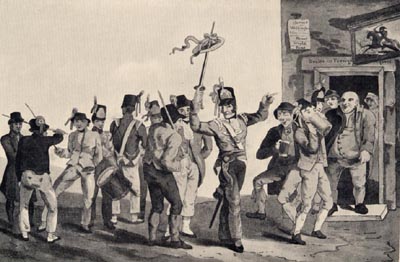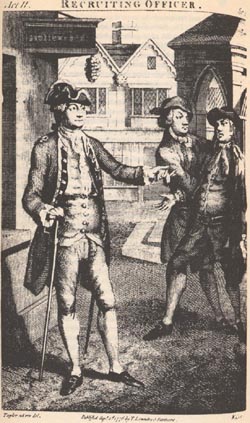
"Sobriety itself is here a bar to success. I see
the greatest rakes are the best recruiters."
-Lt. John Blackader
"So that if your Worship pleases to cast up the
whole Sum, viz. Canting, Lying, Impudence, Pimping, Bullying, Swearing,
Drinking, and a Halbard, you will find the Sum Total amount to a Recruiting
Sergeant."
-Sergeant Kite

'Recruiting Party' Print (artist unknown) (Dewatteville, 104)
So you're minding your own business, downing your sixth pint at the tavern-or
maybe it's your seventh-no, probably your sixth. To tell the truth, you
were never really one for much 'education.' Just another rustic laborer,
no family and few possessions, little ambition or knowledge of the world
outside your rural British town.
Suddenly, a well-dressed man bursting with energy waltzes into the tavern, a young military drummer trailing behind him-a recruitment officer! A jolly, garrulous man, he begins to speak energetically in bright, enthusiastic words about the honor of England, the Queen, and the noble life of the British soldier.

"The Recruiting Officer" William Smith as Plume at Drury Lane, 1776. Engraving, artist unknown. (Farquhar, 29)
He sits, and volunteers to buy a round for everyone, and the tavern begins to take notice. It seems like a dream…or no…actually, it seems just like George Farquhar's 1704 play The Recruiting Officer, a popular comedy that enjoyed a number of successful revivals over the course of the 18th Century! Although a fictionalized account of British recruitment practices, Farquhar's play is not as exaggerated an account as one might think-the recruitment officer truly works to dazzle poor drunkards like yourself, playing on their poverty, their patriotism, their desire for adventure, and their inebriation to lure to sign up for the army. (The officer also lands a tidy sum for each recruit he secures.)(DeWatteville, 67-68)
Offering generous bounties of up to five guineas to those who join him,
the officer easily cajoles you into conversation, and soon has you singing
along in a spirited chorus of "Over the Hills and Over the Main,"
a rousing army song about the fabulous adventures that await the army
man. (The song also makes fun of the tedious, ignoble work of cleaning
shoes and scouring stables-the story of your life.) (Farquahar, 91-92)
Although the recruiter's coercion tactics certainly seem unethical, at
least he gives you some kind of a choice. Although generally, the British
Army (unlike the Navy) prefers not to resort to impressment into the military,
in times of emergency, the government has authorized forced conscription
of unemployed men, debtors, convicts, and other criminal lowlifes. However,
as the attitudes of these troops are commonly less than enthusiastic,
they are usually sent to the least enviable outposts of the British Empire,
such as India, Minorca, or Gibraltar, where they rarely see substantial
action. (DeWatteville, 65-82)
After few hours-or maybe it was minutes-(you were never one for education,)
and several gratuitous pints, you embrace the officer's contagious patriotism
wholeheartedly, and agree to join up! Without hesitation, the recruiting
officer produces the promised five guineas, and drops them into your open
hand. As soon as you accept the money, the contract is officially sealed.
Welcome to the British Army! (DeWatteville, 65-82)